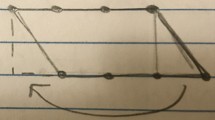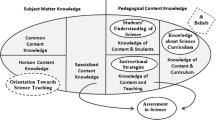Abstract
Nine prospective secondary mathematics teachers were interviewed about their teaching internship experience. The results of these interviews revealed that 7 of the 9 participants professed to value reform-oriented teaching and conceptual understanding in mathematics, yet all were paired with cooperating teachers who seemed to value traditional instruction and procedural understanding in mathematics. We explored the reasons that some of these student interns had positive experiences with their cooperating teachers and university supervisors while others had negative experiences. We found that the participants valued (a) critical feedback that was constructive and contained concrete recommendations for improvement, (b) freedom to use their own teaching methods, and (c) a friendly and supportive relationship with their mentors. The differing teaching philosophies of student teachers and their cooperating teachers contributed to negative experiences only when student teachers were not allowed freedom in their teaching methods.
Similar content being viewed by others
References
Anderson, D. (2007). The role of cooperating teachers’ power in student teaching. Education, 128(2), 307–323.
Beck, C. & Kosnik, C. (2002). Components of a good practicum placement: Student teacher perceptions. Teacher Education Quarterly, 29(2), 81–98.
Borko, H. & Mayfield, V. (1995). The roles of the cooperating teacher and university supervisor in learning to teach. Teaching and Teacher Education, 11(5), 501–518.
Cherian, F. (2007). Learning to teach: Teacher candidates reflect on the relational, conceptual, and contextual influences of responsive mentorship. Canadian Journal of Education, 30(1), 25–46.
Davis, B. & Brown, L. (and Cedillo, T., Chiocca, C.-M., Dawson, S., Gimenez, J., Hodgen, J., Jaworski, B., Kidd, M. & Siemon, D.), Jaworski, B. (Ed.) (2009). Development of teaching in and from practice. In R. Even & D. L. Ball (Eds.), The professional education and development of teachers of mathematics: The 15th ICMI study (pp. 149–165). New York: Springer.
Ensor, P. (2001). Preservice mathematics teacher education to beginning teaching: A study in recontextualizing. Journal for Research in Mathematics Education, 32(3), 296–320.
Feiman-Nemser, S. & Buchmann, M. (1986). When is student teaching teacher education? Washington, DC: Office of Educational Research and Improvement.
Fernandez, M. L. & Erbilgin, E. (2009). Examining the supervision of mathematics student teachers through analysis of conference communications. Educational Studies in Mathematics, 72, 93–110.
Frykholm, J. A. (1999). The impact of reform: Challenges for mathematics teacher preparation. Journal of Mathematics Teacher Education, 2, 79–105.
Giebelhaus, C. R. & Bowman, C. L. (2002). Teaching mentors: Is it worth the effort? Journal of Educational Research, 95(4), 246–254.
Graeber, A. & Tirosh, D. (2008). Pedagogical content knowledge: Useful concept or elusive notion. In P. Sullivan & T. Wood (Eds.), Knowledge and beliefs in mathematics teaching and teaching development (pp. 117–132). Rotterdam, The Netherlands: Sense.
Graham, P. (1999). Powerful influences: A case of one student teacher renegotiating his perceptions of power relations. Teaching and Teacher Education, 15, 523–540.
Grant, T. J., Hiebert, J. & Wearne, D. (1998). Observing and teaching reform-minded lessons: What do teachers see? Journal of Mathematics Teacher Education, 1, 217–236.
Grossman, P., Valencia, S., Evans, K., Thompson, C., Martin, S. & Place, N. (2000). Transitions into teaching: Learning to teach writing in teacher education and beyond (Report Series 13006). Albany, NY: University at Albany, National Research Center on English Learning and Achievement.
Hawkey, K. (1998). Mentor pedagogy and student teacher professional development: A study of two mentoring relationships. Teaching and Teacher Education, 14(6), 657–670.
Hill, H. C., Rowan, B. & Ball, D. L. (2005). Effects of teachers’ mathematical knowledge for teaching on student achievement. American Educational Research Journal, 42(2), 371–406.
Hollingsworth, S. (1989). Prior beliefs and cognitive change in learning to teach. American Educational Research Journal, 26(2), 160–189.
Jaworski, B. & Gellert, U. (2003). Educating new mathematics teachers: Integrating theory and practice, and the roles of practising teachers. In A. J. Bishop, M. A. Clements, C. Keitel, J. Kilpartick & F. K. Leung (Eds.), Second international handbook of mathematics education (pp. 829–875). Dordrecht, The Netherlands: Kluwer.
Leatham, K. R. & Peterson, B. E. (2010). Secondary mathematics cooperating teachers’ perceptions of the purpose of student teaching. Journal of Mathematics Teacher Education, 13, 99–119.
Ma, L. (1999). Knowing and teaching elementary mathematics. Mahwah, NJ: Lawrence Earlbaum Associates.
Mtetwa, D. K. & Thompson, J. J. (2000). The dilemma of mentoring in mathematics teaching: Implications for teacher preparation in Zimbabwe. Professional Development in Education, 26(1), 139–152.
National Council of Teachers of Mathematics (1989). Curriculum and evaluation standards for school mathematics. Reston, VA: National Council of Teachers of Mathematics.
National Council of Teachers of Mathematics (2000). Principles and standards for school mathematics. Reston, VA: National Council of Teachers of Mathematics.
Neubrand, M. & Seago, N. (and Agudelo-Valderrama, C., DeBlois, L. & Leikin, R.), Wood, T. (Ed.) (2009). The balance of teacher knowledge: Mathematics and pedagogy. In R. Even & D. L. Ball (Eds.), The professional education and development of teachers of mathematics: The 15 th ICMI study (pp. 211–225). New York: Springer.
Nilsson, P. (2008). Teaching for understanding: The complex nature of pedagogical content knowledge in pre-service education. International Journal of Science Education, 30(10), 1281–1299.
Ozgun-Koca, S. A. & Sen, A. I. (2006). The beliefs and perceptions of pre-service teachers enrolled in a subject-area dominant teacher education program about “Effective Education”. Teaching and Teacher Education, 22, 946–960.
Peterson, B. E. & Williams, S. R. (2008). Learning mathematics for teaching in the student teaching experience: Two contrasting cases. Journal of Mathematics Teacher Education, 11, 459–478.
Peterson, B. E., Williams, S. R. & Durrant, V. (2005). Factors that affect mathematical discussion among secondary student teachers and their cooperating teachers. New England Mathematics Journal, XXXVII(2), 41–49.
Phillip, R. A. (2007). Mathematics’ teachers beliefs and affect. In F. K. Lester (Ed.), Second handbook of research on mathematics teaching and learning (pp. 257–318). Charlotte, NC: Information Age.
Seidman, I. (1998). Interviewing as qualitative research. New York: Teachers College Press.
Smith, D. N. (2001). The influence of mathematics teachers on student teachers of secondary mathematics. Mathematics Education Review, 13, 22–40.
Strauss, A. & Corbin, J. (1990). Basics of qualitative research. Newbury Park, CA: Sage.
Sullivan, P. & Wood, T. (Eds.). (2008). Knowledge and beliefs in mathematics teaching and teaching development. Rotterdam, The Netherlands: Sense.
Tatto, M. T., Lerman, S. & Novotna, J. (2009). Overview of teacher education systems across the world. In R. Even & D. L. Ball (Eds.), The professional education and development of teachers of mathematics: The 15th ICMI study (pp. 15–23). New York: Springer.
Thompson, G. A. (1984). The relationship of teachers’ conceptions of mathematics and mathematics teaching to instructional practice. Educational Studies in Mathematics, 15, 105–127.
Weasmer, J. & Woods, A. M. (2003). The role of the host teacher in the student teaching experience. The Clearing House, 76(4), 174–177.
Wilson, S. M., Floden, R. E. & Ferrini-Mundy, J. (2002). Teacher preparation research: An insider’s view from the outside. Journal of Teacher Education, 53(3), 190–204.
Author information
Authors and Affiliations
Corresponding author
Rights and permissions
About this article
Cite this article
Rhoads, K., Radu, I. & Weber, K. THE TEACHER INTERNSHIP EXPERIENCES OF PROSPECTIVE HIGH SCHOOL MATHEMATICS TEACHERS. Int J of Sci and Math Educ 9, 999–1022 (2011). https://doi.org/10.1007/s10763-010-9267-7
Received:
Accepted:
Published:
Issue Date:
DOI: https://doi.org/10.1007/s10763-010-9267-7




